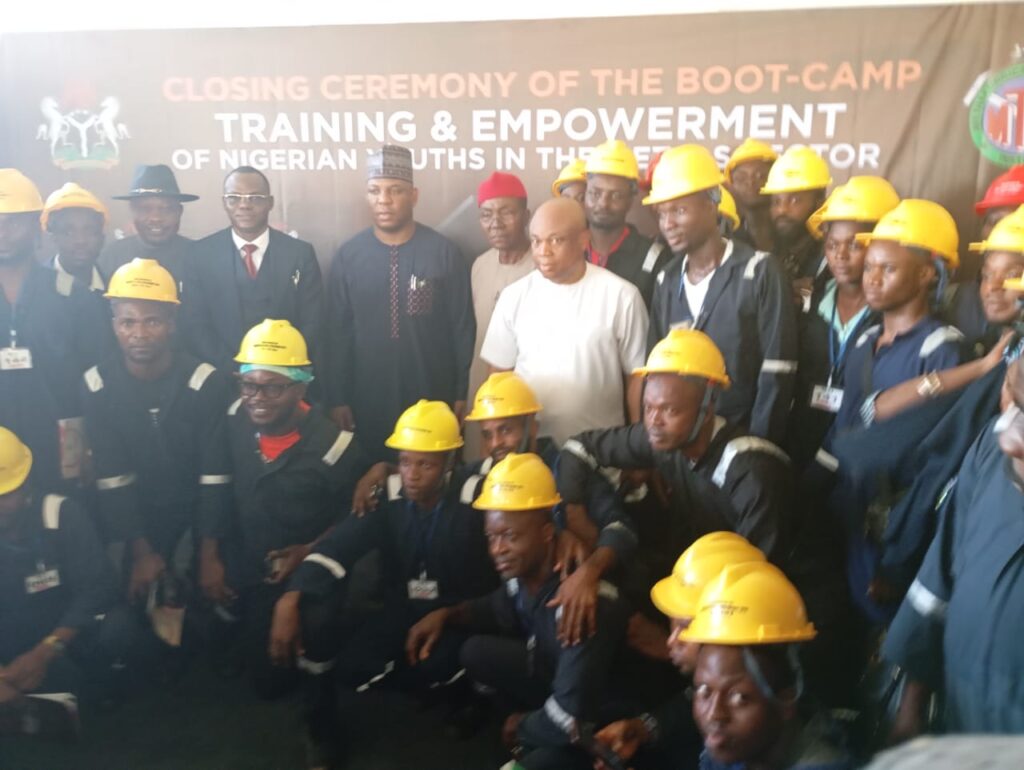The Minister of Steel Development, Shuaibu Abubakar Audu, has called on stakeholders across both public and private sectors to collaborate with the ministry in institutionalizing sustainable skill development as a key driver of Nigeria’s national industrial growth.
Audu made the call during the closing and graduation ceremony of the BOOTCAMP Training and Empowerment Programme organized by the Ministry of Steel Development (MSD) at the Metallurgical Training Institute (MTI), Onitsha-Owerri Expressway, Anambra State.
A total of 535 youths from various states were empowered with starter packs after completing intensive training in the metals and steel sector.
Reiterating the commitment of President Bola Tinubu’s administration to job creation through youth empowerment, the Minister said the beneficiaries are expected to become entrepreneurs in the near future and, in turn, train and empower other youths, thereby contributing to the revitalization of Nigeria’s metals sector.
The training program, coordinated by the Ministry, focused on technical skills such as welding, fabrication, industrial metallurgy, instrumentation systems, and mechanical maintenance.
Addressing the graduates, Prince Audu emphasized that the goal was not only to spur rapid growth in the sector but also to reduce unemployment among Nigerian youths.
“The vision of President Bola Tinubu’s government under the Renewed Hope Agenda is to ensure that the graduates are equipped with practical, hands-on skills, beyond just the issuance of certificates,” he said.
He also disclosed plans to make the Bootcamp an annual event, structured to empower young Nigerians with the knowledge and tools required to become productive contributors to the metals and steel industry and the national economy at large.
Describing the steel industry as the backbone of industrialization, the Minister highlighted efforts to revive ailing steel institutions and the importance of empowering youth to man emerging industrial projects nationwide.
The Director of MTI, Engr. Dr. Uche Obi, in his remarks, stressed the need for modern training equipment and tools to align the institute with current industrial standards. He appealed to the Ministry to assist in procuring and installing up-to-date technical equipment and also requested a recruitment waiver to allow MTI to employ qualified technical personnel.
Dr. Obi further urged the Minister to fast-track the passage of the MTI Enabling Bill currently before the National Assembly. This, he said, would qualify the institute for government interventions such as TETFund support.
Also speaking, Mr. Fredrick Ewa, Director of the Metallurgical Inspectorate Department, Ministry of Steel Development, said the 535 graduates, having received training, tools, and vision, are no longer job seekers but job creators. He revealed that over 258,000 youths applied for the program, but only 700 were selected, with 535 completing the training.
“This programme is not just a training—it is a movement and a clarion call to action, designed to catalyze the rebirth of Nigeria’s metals and steel sector by investing in its most invaluable resource: its youth,” Ewa stated.
In his remarks, Mr. Christian Udechukwu, Anambra State Commissioner for Industry, who represented Governor Chukwuma Soludo, welcomed the Minister and thanked the Federal Government for selecting Anambra as the training location. He assured that the state had the enabling environment and support mechanisms to assist the graduates.
“We have funds for Youth Entrepreneurship Development through the Anambra State Business Agency. We also partner with the Bank of Industry. As this Bootcamp continues annually, we look forward to deeper collaboration with the Federal Government,” he said.
Some of the beneficiaries—including Bagidi Akile Jude (Benue), Ekike Obijulu (Abia), Taiwo Oladimeji (Lagos), and Atahiru Aliyu (Taraba)—described the program as timely and impactful.
They commended President Tinubu for his leadership and vision, which they believe will soon bring stability and progress to Nigeria’s steel sector and broader economy.
The graduates also appealed for advanced training opportunities to further hone their skills and remain competitive in the fast-evolving industrial landscape.
















